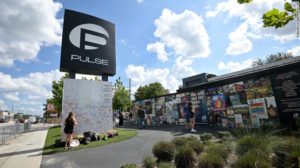
Joel Junior Morales moved to Orlando a few years before the Pulse massacre in search of “his people”, LGBTQ people and Latinos. He found them but Orlando’s queer community at that time was less visible.
He frequented Pulse, a beloved gay nightclub known for drag shows and Latin Nights. The bar was one of the few places where his fellow LGBTQ Latinos felt at home in their city.
When the tragedy at Pulse, on Latin Night June 12, 2016, shuttered the bar for good. Morales lost one friend in the shooting and his best friend was there that night and is still dealing with his trauma.
Morales now dedicates his career to Pulse survivors and families of those who died, many of whom were Latinos. He helps lead the LGBT+ Center, a nonprofit that operates a support center specifically for people affected by the Pulse massacre.
He among other queer Latino residents of Orlando are now the faces of LGBTQ advocacy groups, serve as elected officials, and call attention to the needs of LGBTQ Latinos with platforms they were not afforded before the mass shooting at Pulse. LGBTQ Latino leaders said in an interview that Orlando fundamentally changed after that night at Pulse.
However, to make positive changes for LGBTQ Latinos permanent, those community leaders must continually justify their work to the state and federal government to receive funding or else they risk a decline in progress. In an interview Morales said that multiple organizations were born out the tragedy at Pulse, such as QLatinx, an advocacy organization that began as a support group for LGBTQ Latinos to gather a safe space outside of nightclubs, and the LGBT+ Center’s Orlando United Assistance Center (OUAC). The center provides care for the victims such as case managers, who share many of the same lived experiences as their clients. It connects clients to medical and mental health care, legal services, housing and more, and provide comfort and a friendly ear to those who need it.
Orlando has taken steps to improve safety for LGBTQ residents, such as establishing liaisons within city government and designating businesses as ‘safe places’, where queer victims of crimes can go to get help without fear of discrimination.
The healing in Orlando is not done and Morales and his fellow advocates have no plans to stop their work, either, as draining as it is, until they create a home for queer Latinos like the one they found at Pulse, one where individuality was celebrated and love reigned.